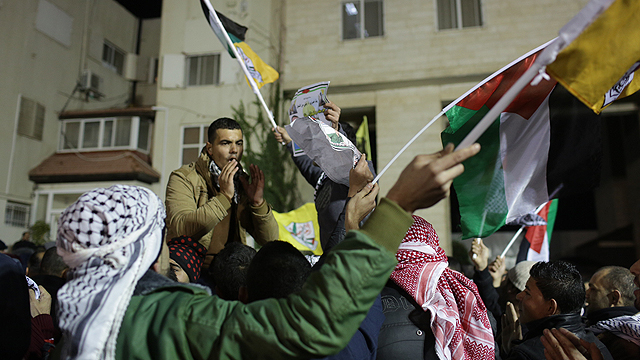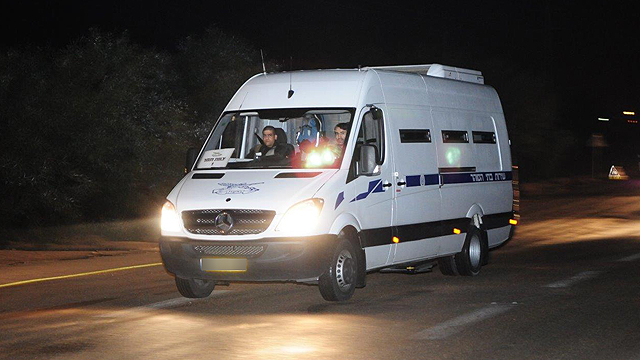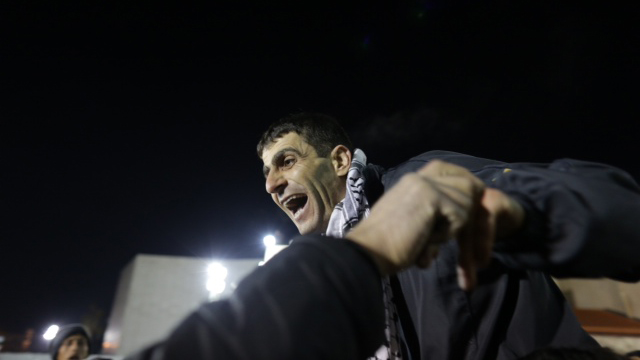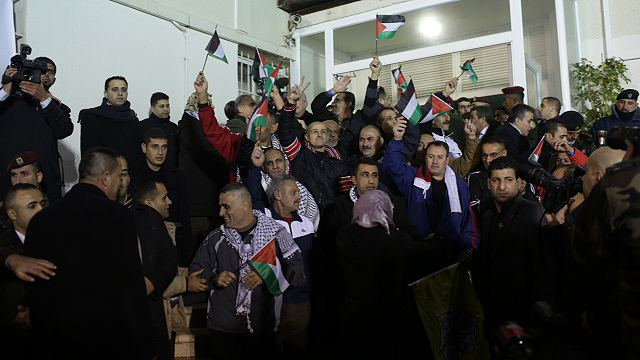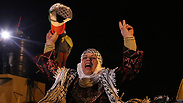
Abbas: 'No final deal until all prisoners are released'
Third group of Palestinian prisoners released from Israeli prison. All 26 Palestinians have been convicted in deadly attacks, have spent between 19, 28 years in prison. In concession from Israel, five are Israeli-Arabs returning to East Jerusalem home
Palestinian security prisoners were released from an Israeli prison and made their way to the West Bank, despite massive protests on the part of bereaved families in Israel and a High Court appeal.
The 26 Palestinian prisoners were released as part of a US brokered peace process and are the third of four such release rounds. Their release was made possible only after a petition by bereaved families was rejected by the High Court.
The three prisoners who were released to Gaza were moved from Ofer Prison to the Erez Crossing. They were met by their families and no official ceremony was held. The five prisoners released to East Jerusalem were transferred to an unspecified location.
Related stories:
- Amid protests, appeal of bereaved families rejected
- Almagor: Prisoner release gives 'tailwind' to terror
- Op-ed: We're fooling ourselves
'Release all prisoners'
PA President Mahmoud Abbas said late Monday night at a ceremony in Ramallah welcoming home the freed prisoners that this was a continuation of even more prisoner releases to come.
"This is day of happiness for our nation, our families and our prisoners, the heroes, who have seen the light of freedom," he said. "We are guaranteeing that this won't be the last time that prisoners are freed."
Abbas said that for the prospective fourth release he hoped that sick prisoners would also be freed, and that they would be sent home and not expelled to other places. He also said that he would not tolerate one Palestinian prisoner in an Israeli jail if there was to be a peace agreement.
"There won't be a final agreement with Israel until all the prisoners are released."
Abbas also commented on the decision in the Knesset of the possible annexation of the Jordan Valley.
"This is our land, and it will remain that way. This a red line on our part," he said.
Several freed Palestinian terrorists also laid flowers at Yasser Arafat's gravesite, and said a short prayer there.
Israeli opposition
Israelis opposed to the move set out from the Jerusalem residence of Prime Minister Benjamin Netanyahu on Monday evening, and marched to the Old City home of one of the prisoners set to go free.
The High Court shot down the petition filed by the Almagor organization which represented the bereaved families earlier Monday night, thus giving the release a green light.
In their petition, the group claimed that Netanyahu failed to make good on his promise to hold a special discussion regarding the release of Palestinian terrorists with Israeli citizenship and five such prisoners will be released Monday night.
The group requested that the court issue an interim order to hold the release until such a discussion is conducted. Justice Elyakim Rubinstein wrote the dissent opinion on the High Court's ruling, objecting to the release of five Israeli-Arabs to east Jerusalem.
Difficult decisions
Netanyahu faced a public uproar Monday over the release Palestinian prisoners convicted in deadly attacks. With Netanyahu expected to accompany the releases with plans to build hundreds of new homes in the West Bank, the criticism came from some unlikely quarters.
Dovish supporters of peace talks said the expected construction would destroy any goodwill created by the prisoner release, while hard-line allies criticized Netanyahu for linking the Jewish settlement cause with the release of prisoners convicted in connection with killings, mostly of Israelis.
"Leadership is judged by the ability to implement decisions, difficult as they may be," Netanyahu told members of the Likud . "We were not elected to make easy decisions."
Under a formula drawn up by US Secretary of State John Kerry, Israel agreed last summer to release a total of 104 long-serving Palestinian prisoners in order to restart peace talks with the Palestinians.
In exchange, the Palestinians dropped their longstanding demand for Israel to halt construction of homes in the West Bank and east Jerusalem. The Palestinians say they have received vague assurances that Israel would show restraint while the talks continue until an April target date for an agreement.
(Photo: Ohad Zwigenberg)
(Photo: Ohad Zwigenberg)
(Photo: Ohad Zwigenberg)
(Photo: Ohad Zwigenberg)
The latest prisoner release is the third of four planned stages. All 26 of the men have been convicted in deadly attacks, and have spent between 19 and 28 years in prison. They included 18 men from the West Bank, three Gazans, and in a concession by Israel, five men from east Jerusalem.
The coming releases generated excitement throughout Palestinian society, where prisoners held by Israel are revered as heroes and freedom fighters. Families decorated their homes and neighborhoods with posters of their loved ones who were returning home and planned large feasts.
The family of Ahmed Shihadeh was busy preparing a welcoming celebration in the Qalandia refugee camp in the West Bank. Shihadeh, 51, has spent nearly 29 years in prison after being convicted in the murder of an alleged collaborator with Israel.
His mother Haseba, 75, said she has "spent my life" visiting her son, but hasn't been able to make the trip for the past two years because she can no longer walk. "I've visited him in 14 jails. I would leave my kids screaming and go for a visit," she said.
In the east Jerusalem neighborhood of Jabal al-Mukaber, the sound of kettle drums and ululating women filled the air as residents braced for the return of Jamal Abu Jamal, who has spent nearly 20 years in prison for a stabbing attack.
Women holding Abu Jamal's picture sang and danced in circles and praised Palestinian President Mahmoud Abbas for securing his release. His mother Rayouf, 77, who is unable to speak after suffering two strokes, sat in a chair with tears in her eyes.
"Since she heard the news, she's getting better," said Abu Jamal's sister Huda. "I can't express how happy she is."
Prisoners for settlements
In an apparent attempt to blunt domestic criticism of such releases, Netanyahu is expected to approve plans to build 1,400 new homes in both the West Bank and east Jerusalem in the coming days.
The Palestinians say such construction undermines peace efforts, and have appealed to the US to block the expected announcement. The US and the European Union have harshly criticized settlement announcements during the current round of negotiations, with U.S. Secretary of State John Kerry at one point questioning Israel's commitment to peace. Kerry is expected back in the region this week in another effort to breathe life into the negotiations.
But Netanyahu indicated he would not back down. "In these negotiations we are faced with our essential interests, including guaranteeing the settlements in the land of Israel," he said.
Netanyahu's decision to press forward with settlement construction at such a sensitive time has drawn criticism from all directions.
Amir Peretz, a Cabinet minister from Hatnua , said the painful site of watching convicted killers walk free could have been avoided had Netanyahu agreed to freeze settlement construction.
"I would have preferred to freeze settlement building rather than releasing (Palestinian) prisoners but at this point we must allow this stage to move forward, we must not do anything to prevent it," he said.
Settler leader Dani Dayan, on the other hand, said the timing of a new settlement announcement looked bad. "The linkage between the release of convicted terrorists and the construction in Jerusalem and in Judea and Samaria puts an unnecessary stain on the construction," he said.
The "original sin," he added, was agreeing to release any prisoners in the first place. "Israel should have rejected the notion that it has to pay a price for negotiations," he said.
Commentators have also questioned Netanyahu's judgment: "If Netanyahu has already undertaken to make this goodwill gesture, it would be best if he were to enjoy the international dividend that comes with it and not ruin things with a populist announcement about new construction," Shimon Shiffer wrote.
"Netanyahu is like a cow that gives a bucket-full of milk, only to kick the bucket over."
Omri Efraim, Aviel Magnezi, and the Associated Press contributed to this report











